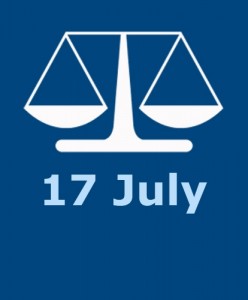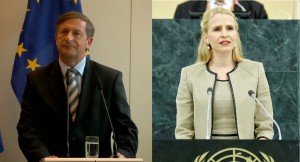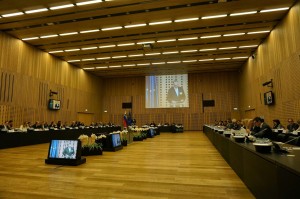

Our purpose: Promoting peace through criminal justice – preventing crimes of aggression
Through the United Nations Charter, States have expressed their commitment “to save succeeding generations from the scourge of war”. They have agreed to renounce the illegal threat or use of force, and to settle their disputes “by peaceful means in such a manner that international peace and security, and justice, are not endangered”. States have the legal duty to abide by this commitment and the UN Security Council has the primary responsibility to enforce it.The Nuremberg Trials made it clear that criminal justice also has an important role to play for the promotion of peace and the deterrence of acts of aggression – though it remained limited and theoretical for many decades thereafter. With the 2010 Kampala amendments to the Rome Statute of the International Criminal Court, States Parties created a new mechanism to enforce the most important rule of international law: the prohibition of the illegal use of force under the United Nations Charter. This website is dedicated to making accountability a reality.
News
U pcoming Panel Discussion: “Into the homestretch – towards the activation of the Kampala Amendments on the Crime of Aggression“: The Mission of Liechtenstein and the Global Institute for the Prevention of Aggression will be commemorating 17 July, International Criminal Justice Day, with a panel discussion on the crime of aggression at UN Headquarters in New York. The panel will feature Judge Sang-Hyun Song, President of the International Criminal Court, renowned international legal scholar Beth van Schaack, as well as the Permanent Representatives of Liechtenstein and Slovenia to the United Nations. It will be moderated by David Tolbert, President of the International Center for Transitional Justice. The panelists will explore the relevance of the amendments and the challenges ahead of their activation in 2017.
pcoming Panel Discussion: “Into the homestretch – towards the activation of the Kampala Amendments on the Crime of Aggression“: The Mission of Liechtenstein and the Global Institute for the Prevention of Aggression will be commemorating 17 July, International Criminal Justice Day, with a panel discussion on the crime of aggression at UN Headquarters in New York. The panel will feature Judge Sang-Hyun Song, President of the International Criminal Court, renowned international legal scholar Beth van Schaack, as well as the Permanent Representatives of Liechtenstein and Slovenia to the United Nations. It will be moderated by David Tolbert, President of the International Center for Transitional Justice. The panelists will explore the relevance of the amendments and the challenges ahead of their activation in 2017.
All are invited to attend. Please have a look at our upcoming events page for more information, including how to register.
 Foreign Ministers of Slovenia and Liechtenstein call for ratification of Kampala Amendments: The open letter was penned by Karl Erjavec, Deputy Prime Minister and Minister of Foreign Affairs of Slovenia and Aurelia Frick, Minister of Foreign Affairs of Liechtenstein on the occasion of the regional workshop for Eastern Europe. In their letter, the ministers take stock of the founding and operation of the International Criminal Court, concluding that “never before has international criminal justice been such an important factor in the international community’s response to violent conflict.” They then turn to the Kampala Amendments on the crime of aggression which will enable the ICC to help to enforce a key provision of the Charter of the United Nations. Activation of the amendments would be a triumph of principles over politics. “We invite all our fellow ICC States Parties to join us on this path and call upon States not Parties to the Rome Statute to embrace the ICC and, by so doing, join the fight against impunity,” the ministers conclude.
Foreign Ministers of Slovenia and Liechtenstein call for ratification of Kampala Amendments: The open letter was penned by Karl Erjavec, Deputy Prime Minister and Minister of Foreign Affairs of Slovenia and Aurelia Frick, Minister of Foreign Affairs of Liechtenstein on the occasion of the regional workshop for Eastern Europe. In their letter, the ministers take stock of the founding and operation of the International Criminal Court, concluding that “never before has international criminal justice been such an important factor in the international community’s response to violent conflict.” They then turn to the Kampala Amendments on the crime of aggression which will enable the ICC to help to enforce a key provision of the Charter of the United Nations. Activation of the amendments would be a triumph of principles over politics. “We invite all our fellow ICC States Parties to join us on this path and call upon States not Parties to the Rome Statute to embrace the ICC and, by so doing, join the fight against impunity,” the ministers conclude.
The full text of the open letter is available online.
Photo credit: Kris Kotarski/Wayamo Foundation and United Nations
 Successful conclusion of regional workshop for Eastern Europe: The two-day seminar brought together States from the Eastern European region to discuss the ratification and implementation of the Kampala amendments on the crime of aggression. There is no doubt that the region is on the leading edge of the fight against illegal war making: four States from the region have ratified the amendments (Croatia, Estonia, Slovakia, Slovenia), five more are expected to ratify before the end of the year (Albania, Czech Republic, Georgia, Macedonia, Poland), and the remaining nine are working on the ratification process. Speakers at the workshop included Karl Erjavec, Minister for Foreign Affairs of Slovenia and UN Secretary-General Ban Ki-moon, who contributed a video message, as well as the Presidents of the International Criminal Court and its Assembly of States Parties.
Successful conclusion of regional workshop for Eastern Europe: The two-day seminar brought together States from the Eastern European region to discuss the ratification and implementation of the Kampala amendments on the crime of aggression. There is no doubt that the region is on the leading edge of the fight against illegal war making: four States from the region have ratified the amendments (Croatia, Estonia, Slovakia, Slovenia), five more are expected to ratify before the end of the year (Albania, Czech Republic, Georgia, Macedonia, Poland), and the remaining nine are working on the ratification process. Speakers at the workshop included Karl Erjavec, Minister for Foreign Affairs of Slovenia and UN Secretary-General Ban Ki-moon, who contributed a video message, as well as the Presidents of the International Criminal Court and its Assembly of States Parties.
Statements:
UN Secretary-General’s message
Ben Ferencz’s message
President Song‘s statement.
UN Legal Counsel‘s statement.
Press Releases:
Press Release by the Ministry of Foreign Affairs of Slovenia
Joint Press Release
Photo: Kris Kotarski / Wayamo Foundation
 Prohibiting the illegal use of force – promoting of the Kampala Amendments in Eastern Europe: On 15 and 16 May, Slovenia, Liechtenstein and the Global Institute for the Prevention of Aggression will be hosting a workshop on the Kampala Amendments and the universality of the Rome Statute in Ljubljana, Slovenia. The high-level segment will feature ICC-President Judge Song, UN Under-Secretary-General for Legal Affairs Serpa Soares, President of the ICC-States Parties Intelmann and Slovenian Foreign Minister Erjavec, as well as video messages by UN Secretary-General Ban Ki-moon and Ben Ferencz. Four of the 18 Eastern European States Parties have ratified the amendments (most recently Slovakia on 18 April 2014), and several others will do so in the near future. The workshop aims to encourage even more States in the region to ratify and to provide concrete assistance for this process. Eastern European States which have not joined the Rome Statute yet are also invited.
Prohibiting the illegal use of force – promoting of the Kampala Amendments in Eastern Europe: On 15 and 16 May, Slovenia, Liechtenstein and the Global Institute for the Prevention of Aggression will be hosting a workshop on the Kampala Amendments and the universality of the Rome Statute in Ljubljana, Slovenia. The high-level segment will feature ICC-President Judge Song, UN Under-Secretary-General for Legal Affairs Serpa Soares, President of the ICC-States Parties Intelmann and Slovenian Foreign Minister Erjavec, as well as video messages by UN Secretary-General Ban Ki-moon and Ben Ferencz. Four of the 18 Eastern European States Parties have ratified the amendments (most recently Slovakia on 18 April 2014), and several others will do so in the near future. The workshop aims to encourage even more States in the region to ratify and to provide concrete assistance for this process. Eastern European States which have not joined the Rome Statute yet are also invited.
For more information, see upcoming events as well as the event’s programme.
Media representatives are invited to a press conference. Any enquiries about media coverage of the workshop should be sent to Bettina Ambach (Bettina@bettinaambach.de).
Photo © tourism-ljubljana
 Slovakia ratifies Kampala Amendments: On 28 April 2014, State Secretary Peter Burian deposited Slovakia’s instrument of ratification of the Kampala Amendments at the United Nations. Slovakia is the 14th State to have ratified the Kampala Amendments on the Crime of Aggression, the fourth Eastern European State and the seventh NATO Member State to do so. The Ratification comes on the eve of the regional workshop on the Kampala Amendments for the Eastern European region, which will take place in Ljubljana, Slovenia on 15 & 16 May. See our upcoming events page for more information.
Slovakia ratifies Kampala Amendments: On 28 April 2014, State Secretary Peter Burian deposited Slovakia’s instrument of ratification of the Kampala Amendments at the United Nations. Slovakia is the 14th State to have ratified the Kampala Amendments on the Crime of Aggression, the fourth Eastern European State and the seventh NATO Member State to do so. The Ratification comes on the eve of the regional workshop on the Kampala Amendments for the Eastern European region, which will take place in Ljubljana, Slovenia on 15 & 16 May. See our upcoming events page for more information.
Photo © UN/Win Khine: UN Under-Secretary-General for Legal Affairs, Miguel de Serpa Soares (second from right) accepts Slovakia’s instrument of ratification from State Secretary Peter Burian (second from left). Ambassador Tiina Intelmann, President of the Assembly of States Parties to the Rome Statute (on the right) and Ambassador Christian Wenaweser of Liechtenstein (on the left) witness the event.
 Slovak Parliament approves ratification of Kampala Amendments: On 26 March 2013 the National Council of Slovakia agreed to the ratification of the Kampala Amendments to the Rome Statute. They must now be approved by the Slovak President before an instrument of ratification can be deposited. Prior to the near-unanimous approval by the plenary, the Amendments had been considered by the Foreign Affairs and the Constitutional and Legal Affairs Committees. Slovakia is on track to become the 14th State Party to the Kampala Amendments on the crime of aggression, and would be the fourth State in Eastern Europe to ratify.
Slovak Parliament approves ratification of Kampala Amendments: On 26 March 2013 the National Council of Slovakia agreed to the ratification of the Kampala Amendments to the Rome Statute. They must now be approved by the Slovak President before an instrument of ratification can be deposited. Prior to the near-unanimous approval by the plenary, the Amendments had been considered by the Foreign Affairs and the Constitutional and Legal Affairs Committees. Slovakia is on track to become the 14th State Party to the Kampala Amendments on the crime of aggression, and would be the fourth State in Eastern Europe to ratify.
Photo © AP
 New Zealand Justice Minister opens Pacific regional workshop: Hon. Judith Collins, MP, Minister of Justice of New Zealand, opened the Pacific regional workshop on the universality of the Rome Statute and the crime of aggression. She noted that “given the history of the Pacific region, the illegal use of force contrary to the United Nations Charter has particular resonance.”
New Zealand Justice Minister opens Pacific regional workshop: Hon. Judith Collins, MP, Minister of Justice of New Zealand, opened the Pacific regional workshop on the universality of the Rome Statute and the crime of aggression. She noted that “given the history of the Pacific region, the illegal use of force contrary to the United Nations Charter has particular resonance.”
Ban Ki-moon, Secretary-General of the United Nations sent a message to the workshop’s opening, in which he said that he looked forward to receiving more instruments of ratification of the Kampala amendments from the region. In his speech, the President of the ICC, Hon Judge Sang-Hyun Song outlined why States from the region should join the Rome Statute.
During the workshop, taking place on 6 and 7 March, participants from Pacific Island States and States from the surrounding Asian region will address topics like the achievements and challenges of the Court’s first 12 years and the road from Rome to Kampala, amongst others. See our past events page for more information.
Relevant documents:
- Minister of Justice’s press release and the full text of her speech.
- United Nations Secretary-General’s message.
- ICC President’s statement.
 New Zealand Workshop begins with Press Conference: On the eve of the Workshop for the Universality of the Rome Statute of the International Criminal Court and the Kampala Amendments on the Crime of Aggression in the Pacific Region, New Zealand press were given an opportunity to ask questions relating to the ICC and to the crime of aggression. Hon Judge Sang-Hyun Song (President, ICC), Christian Wenaweser (Liechtenstein’s Ambassador to the UN) and Dr. Penelope Ridings (Legal Adviser to the Ministry of Foreign Affairs and Trade New Zealand) briefed the media on the workshop and the issues to be covered.
New Zealand Workshop begins with Press Conference: On the eve of the Workshop for the Universality of the Rome Statute of the International Criminal Court and the Kampala Amendments on the Crime of Aggression in the Pacific Region, New Zealand press were given an opportunity to ask questions relating to the ICC and to the crime of aggression. Hon Judge Sang-Hyun Song (President, ICC), Christian Wenaweser (Liechtenstein’s Ambassador to the UN) and Dr. Penelope Ridings (Legal Adviser to the Ministry of Foreign Affairs and Trade New Zealand) briefed the media on the workshop and the issues to be covered.
The Audio of Press Conference on ICC Workshop (32:27 minutes) is available to download.
Media from the Pacific region are invited to participate in a telephone press conference (7 March 2014 at 12.30 (NZDT)). Please see the press advisory for further details.
